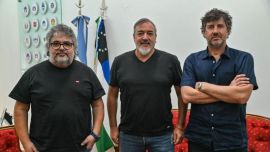Responding to startling homicide rates and ongoing violence, Argentina’s government Wednesday deployed reinforcements to combat drug-trafficking in the crime-ridden agro-industrial city of Rosario.
Argentina's third-largest city by population (at 1.3 million), which has suffered a plague of drug-related violence over the past two decades, attracted international attention last week when two unknown men on motorbikes shot up a supermarket owned by the in laws of football star Lionel Messi, with the assailants leaving behind a threatening message mentioning the Rosario-born national team captain by name.
After a youngster was slain in a drive-by shooting last week, prompting residents to launch angry vigilante attack on the homes of suspected drug-traffickers, the government announced it would boost the number of federal security officers available to the troubled region.
On Wednesday, the reinforcements sent by President Alberto Fernández arrived in the region, bringing force numbers to 1,400.
Rosario remains in the grip of drug violence. The port city has registered more than one death per day already so far in March, according to data compiled by Observatorio de Seguridad Pública (Public Security Observatory).
According to a report from the body, using data collected until the beginning of the week, the city has already counted eight deaths in March from intentional homicides.
The data underlines the devastating violence that has gripped in the city for the past 20 years. For Santa Fe Province as a whole, 95 homicides have been recorded since the turn of the year, with Rosario alone responsible for 65 of those.
In 2022, a total of 288 homicides were recorded in Rosario out of a provincial total of 408.
The public was shocked this week by images of violent incidents in the neighbourhood, when relatives and neighbours of the young boy killed over the weekend ransacked and set fire to the houses of those allegedly responsible for the crime.
As a result of the neighbourhood attack, drug gangs sent threats via social networks of firing "bullets at everyone" in retaliation.
President Fernández has also ordered the deployment of members of the Army's engineering corp to assist in the urbanisation of poor neighbourhoods where drug-trafficking is rampant. The military will act without weapons due to the strict constitutional prohibition of intervention in internal security.
Some human rights organisations reject the deployment of the military. "It is a serious act that shows the political failure to seriously resolve urban violence," said the Centre for Legal and Social Studies (CELS).
Responding to the government announcement, Rosario's Attorney General María Eugenia Iribarren told LT8 radio that "there are cases of police complicity with drug-trafficking, in a degradation that has been going on for years."
Security Minister responds
Addressing a police battalion in Rosario on Wednesday, Security Minister Aníbal Fernández responded to the violence and declared, "we all know what is happening, it is imperative that we get to the core."
Flanked by Santa Fe Province Governor Omar Perotti, the minister announced the arrival of 300 border patrol troops and 100 federal police officers in the province to assist efforts to tackle the violence that critics have denounced him for failing to address.
Former president Mauricio Macri and a number of opposition presidential hopefuls, including PRO party chair Patricia Bullrich and Buenos Aires City Mayor Horacio Rodríguez Larreta, have criticised the official and slammed the national government’s failure to combat increasing drug-violence.
Rosario Mayor Pablo Javkin has repeatedly insisted the security minister and the national government need to do more to combat the city's incessant crimewave. "It is very clear that it is easy to harm Rosario and that there is not a damn bit of concrete help," he said, responding to the violence last week.
Defending his portfolio, Aníbal Fernández warned that "nothing that needs to be done is easy and simple.” He clarified, "We have to continue deepening all that task that guarantees that we are entering each one of the neighbourhoods with knowledge, with work, with effort, with a lot of responsibility and many tools."
Juntos por el Cambio opposition José Núñez (Santa Fe Province) told Perfil that the ministry should “work in Rosario.” He continued: "That is where the minister has to be and not drinking coffee in an office in Recoleta and making statements that do not bring peace to the people of Rosario."
–– TIMES/AFP/Perfil
























Comments